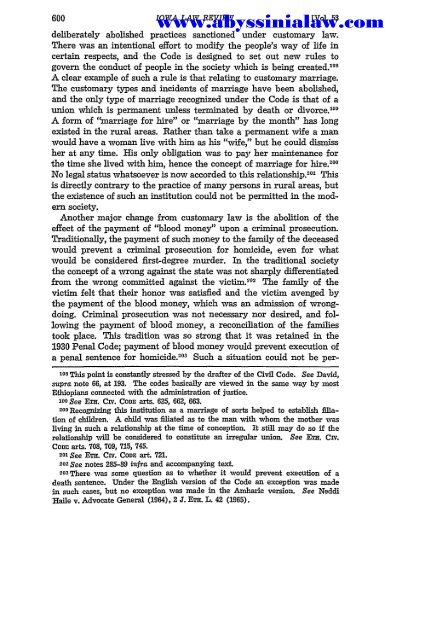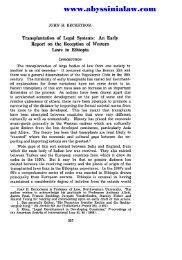You also want an ePaper? Increase the reach of your titles
YUMPU automatically turns print PDFs into web optimized ePapers that Google loves.
IOWA LAW REVIEW<br />
deliberately abolished practices sanctioned under customary law.<br />
There was an intentional effort to modify the people's way of life in<br />
certain respects, and the Code is designed to set out new rules to<br />
govern the conduct of people in the society which is being created.1' s<br />
A clear example of such a rule is that relating to customary marriage.<br />
The customary types and incidents of marriage have been abolished,<br />
and the only type of marriage recognized under the Code is that of a<br />
union which is permanent unless terminated by death or divorce. 199<br />
A form of "marriage for hire" or "marriage by the month" has long<br />
existed in the rural areas. Rather than take a permanent wife a man<br />
would have a woman live with him as his "wife," but he could dismiss<br />
her at any time. His only obligation was to pay her maintenance for<br />
the time she lived with him, hence the concept of marriage for hire. 200<br />
No legal status whatsoever is now accorded to this relationship. 201 This<br />
is directly contrary to the practice of many persons in rural areas, but<br />
the existence of such an institution could not be permitted in the modern<br />
society.<br />
Another major change from customary law is the abolition of the<br />
effect of the payment of "blood money" upon a criminal prosecution.<br />
Traditionally, the payment of such money to the family of the deceased<br />
would prevent a criminal prosecution for homicide, even for what<br />
would be considered first-degree murder. In the traditional society<br />
the concept of a wrong against the state was not sharply differentiated<br />
from the wrong committed against the victim. 0 2 The family of the<br />
victim felt that their honor was satisfied and the victim avenged by<br />
the payment of the blood money, which was an admission of wrongdoing.<br />
Criminal prosecution was not necessary nor desired, and following<br />
the payment of blood money, a reconciliation of the families<br />
took place. This tradition was so strong that it was retained in the<br />
1930 Penal Code; payment of blood money would prevent execution of<br />
a penal sentence for homicide. 20 3 [Vol. 53<br />
www.abyssinialaw.com<br />
Such a situation could not be per-<br />
1'8 This point is constantly stressed by the drafter of the Civil Code. See David,<br />
supra note 66, at 193. The codes basically are viewed in the same way by most<br />
Ethiopians connected with the administration of justice.<br />
199 See ETH. CIV. CODE arts. 625, 662, 663.<br />
20 o Recognizing this institution as a marriage of sorts helped to establish fiia-<br />
tion of children. A child was filiated as to the man with whom the mother was<br />
living in such a relationship at the time of conception. It still may do so if the<br />
relationship will be considered to constitute an irregular union. See Era. CIV.<br />
CODE arts. 708, 709, 715, 745.<br />
201 See ETa. CIv. CODE art. 721.<br />
2 02 See notes 285-89 infra and accompanying text.<br />
203 There was some question as to whether it would prevent execution of a<br />
death sentence. Under the English version of the Code an exception was made<br />
in such cases, but no exception was made in the Ambaric version. See Neddi<br />
Haile v. Advocate General (1964), 2 J. Ema. L. 42 (1965).





